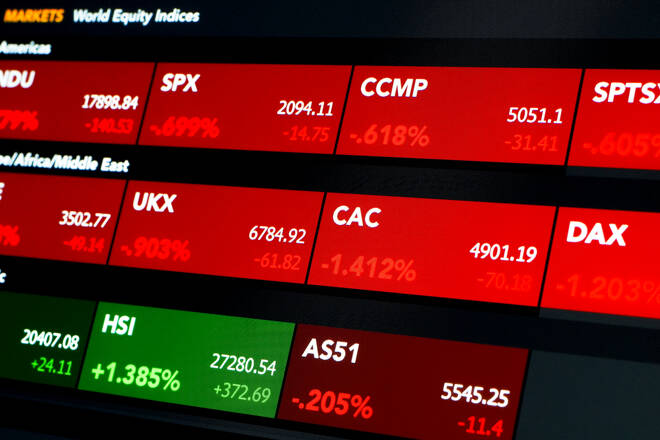Advertisement
Advertisement
European Equities: A Week in Review – 25/12/20
By:
It was a week in the red for the majors, with COVID-19 overshadowing a Brexit deal.
The Majors
It was a mixed week for the European majors in the shortened week ending 24th December 2020. German and Italian markets were closed on Thursday and Friday, with France on a shortened session on Thursday.
The DAX30 and CAC40 fell by 0.32% and by 0.10% respectively, while the EuroStoxx600 rose by 0.02%.
A bearish start to the week left the majors in the deep red. News of a new coronavirus strain in the UK and a lack of progress towards a Brexit deal weighed.
EU member states and beyond banned UK travel in response to the news of the new strain in a bid to avoid exposure to the more virulent strain.
Sentiment shifted on Tuesday, however, supporting recovery from Monday’s sell-off.
Support kicked in following news of U.S lawmakers agreeing on an $892bn COVID-19 stimulus package, however. Even news of Trump’s unwillingness to sign the stimulus bill failed to sink the majors. Expectations are that a more substantial and meaningful package would provide more material support to the economic recovery.
In spite of the negative news on the COVID-19 front, news of an imminent Brexit deal also delivered support for the majors.
The Stats
It was a quiet week on the economic calendar. Key stats included Flash Eurozone Consumer Confidence and German GfK Consumer Climate figures.
For the Eurozone, the Flash Consumer Confidence Indicator rose from -17.6 to -13.9. In spite of the uptick, the indicator remained well below its long-run average of -11.2, however.
From Germany, the GfK Consumer Climate Indicator fell from -6.7 to -7.3 in January. Economists had forecasted a larger decline to -8.8. A fall in income expectations weighed on the headline figure, with the latest spike in new COVID-19 cases and lockdown measures raising uncertainty.
On Wednesday, finalized 3rd quarter GDP figures from Spain had a muted impact on the majors.
Spain’s economy expanded by 16.4% in the 3rd quarter, according to finalized figures, revised down from a prelim 16.7%. In the 2nd quarter, the economy had contracted by 17.9%, quarter-on-quarter.
From the U.S
Economic data was on the heavier side, with November core durable goods, personal spending, and inflation figures in focus. Weekly jobless claims figures also drew interest ahead of the holidays.
In the week ending 18th December, initial jobless claims stood at 805k, falling back from an upwardly revised 892k from the previous week.
Durable goods orders were also positive, with orders rising by 0.9% in November, following a 1.8% increase in October. Core durable goods fell short of forecasts, however, rising by 0.4%. In October, core durable goods orders had increased by 1.9%.
On the negative, however, was a fall in personal spending. In November, personal spending fell by 0.4%, reversing a 0.3% rise in October. Economists had forecasted a 0.2% decline.
Inflation figures were market neutral in spite of falling short of forecasts. In November, the core PCE Price Index rose by 1.4%, following a 1.4% increase in October. Economists had forecasted a 1.5% increase.
Other stats included finalized 3rd quarter GDP and consumer sentiment figures together with November housing sector data. The stats had a muted impact on the European majors, however.
The Market Movers
From the DAX, it was a mixed week for the auto sector. Continental bucked the trend, rising by 2.39%. It was a bearish week for the rest of the majors, however. Volkswagen and Daimler fell by 0.33% and by 0.50% respectively, with BMW ending the week down by 0.72%.
It was a mixed week for the banking sector, however. Commerzbank rose by 1.32%, while Deutsche Bank slipped by 0.67%.
From the CAC, it was a bullish week for the banks. Credit Agricole rose by 2.14% to lead the way, with BNP Paribas and Soc Gen seeing more modest gains of 0.53% and 1.35% respectively.
It was another bullish week for the French auto sector, however. Peugeot rose by 2.43%, with Renault gaining 1.22%.
Air France-KLM ended a run of weekly losses, with a 3.69% gain, with Airbus ending the week up by 3.42%.
On the VIX Index
It was a 2nd consecutive week in the red for the VIX. In the week ending 24th December, the VIX slipped by 0.19%. Following on from a 7.46% slide from the previous week, the VIX ended the week at 21.53.
For the week, NASDAQ and Dow rose by 0.38% and by 0.07% respectively, while the S&P500 fell by 0.17%.
The Week Ahead
It’s another particularly quiet and shortened week ahead on the economic calendar.
Key stats include French jobseeker totals and December inflation figures from Spain.
The numbers are unlikely to have any influence on the European majors, however.
From the U.S, it’s also a quiet week ahead. The weekly jobless claims figures are due out in the week.
With the European markets closed or set for early closure on Thursday, however, jobless claims figures won’t influence the majors.
Away from the economic calendar, the key drivers will continue to include Brexit and COVID-19 news. Any chatter from Capitol Hill on the COVID-19 stimulus package will also provide direction.
About the Author
Bob Masonauthor
With over 28 years of experience in the financial industry, Bob has worked with various global rating agencies and multinational banks. Currently he is covering currencies, commodities, alternative asset classes and global equities, focusing mostly on European and Asian markets.
Advertisement
